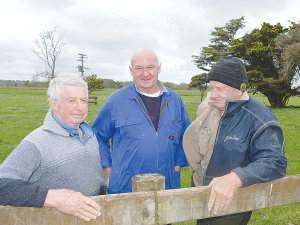Battle for milk
OPINION: Fonterra may be on the verge of selling its consumer business in New Zealand, but the co-operative is not keen on giving any ground to its competitors in the country.
 Fonterra farmers, from left, Jim Cotman, Trevor Simpson and Malcolm Lumsden want the Shareholders Council scrapped.
Fonterra farmers, from left, Jim Cotman, Trevor Simpson and Malcolm Lumsden want the Shareholders Council scrapped.
OPINION: Tension's been simmering among Fonterra shareholders for some time.
Read: A group of Fonterra farmers want the Shareholders Council scrapped.
Some are unhappy with the co-op’s financial performance over the past two years, others are frustrated with the lack of information coming from the board of directors.
A group of shareholders are also venting their anger at the Fonterra Shareholders Council, a 25-member elected body tasked with the role of “representing the views of all shareholders as suppliers, owners and investors”.
It also meets regularly with Fonterra’s board and management to discuss the co-op’s performance.
Two years ago Fonterra shareholders were stunned to learn that their co-op had recorded its first ever net loss after tax of $196 million for the 2017-18 year.
What didn’t help either was confirmation that former chief executive Theo Spierings left with a final year’s salary of $8 million the same year.
Then things got worse. The following financial year, Fonterra posted a net loss of $605 million on the back of asset writedowns worth $826m, mainly on its offshore businesses.
Shareholders like Trevor Simpson, Jim Cotman, Mark Lumsden and Mike Peters of Waikato have had enough.
For them there must be a better and more efficient way for shareholders to keep a tab on their co-op’s performance.
The nasty surprises delivered by the board and management in 2018 and 2019 financial year must end.
Simpson and his group want the council to step up. That’s why the review of the council is crucial for the co-op and its 10,000 shareholders.
They want the council scrapped. Others may not be keen to go that far. But what’s certain is that things must change.
Right now the council has no say in how the co-op is run and the investments it makes both here and overseas.
The council reviews the performance of Fonterra’s investments years after millions of dollars have been poured into dud projects, like China Farms and Beingmate.
Therefore, it’s unfair to blame the council for Fonterra’s investment failures: accountability rests with the board and management.
But Fonterra directors’ hands are tired when it comes to talking directly to shareholders. NZX disclosure requirements means the co-op must deal carefully with market-sensitive information. This is the dilemma facing Fonterra. Trading Among Farmers (TAF) has broken the open and free-flowing communication link between shareholders and directors.
How can this link be restored? Will scrapping the council be enough?
These are the questions shareholders will ponder as they mull the future make-up of the council in the coming months.
Reflecting on the past year, Horticulture New Zealand chief executive Kate Scott says there has been a lot to celebrate.
Ministry for Primary Industries (MPI) Director General Ray Smith is giving a big shout-out to the horticulture sector, especially kiwifruit.
Early forecasts for New Zealand's apples and pears point to a standout season marked by exceptional fruit quality and high pack-out rates.
Tickets are now available for Beef + Lamb New Zealand’s (B+LNZ) Out the Gate, returning from 19-21 May 2026 at Te Pae, Christchurch.
Dairy Women's Network (DWN) is welcoming AgriHealth as a new partner.
Northland Field Days patron Ross Newlove remembers the inaugural field days he attended 40 years ago.
OPINION: Fonterra may be on the verge of selling its consumer business in New Zealand, but the co-operative is not…
OPINION: What does the birth rate in China have to do with stock trading? Just ask a2 Milk Company.